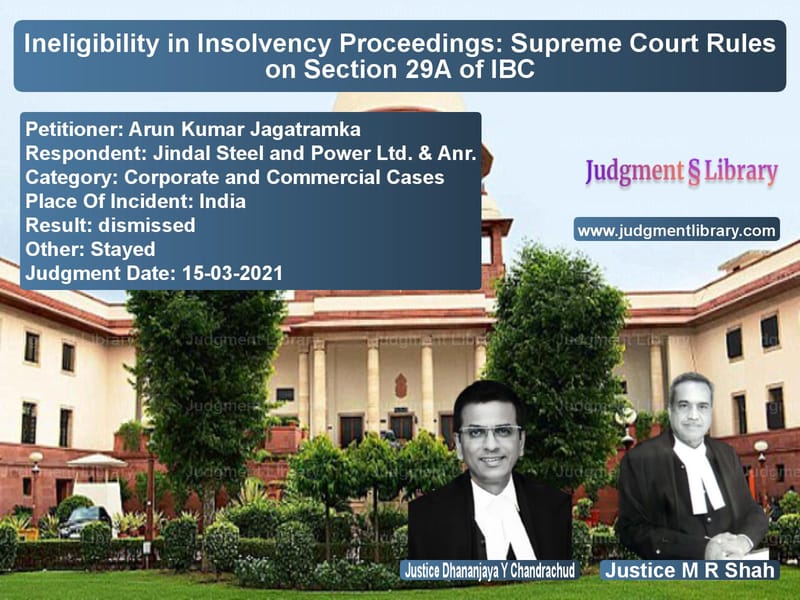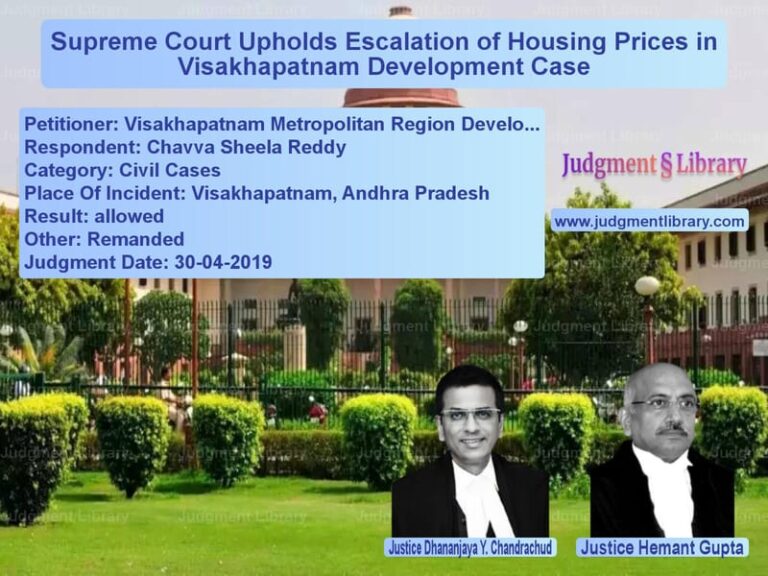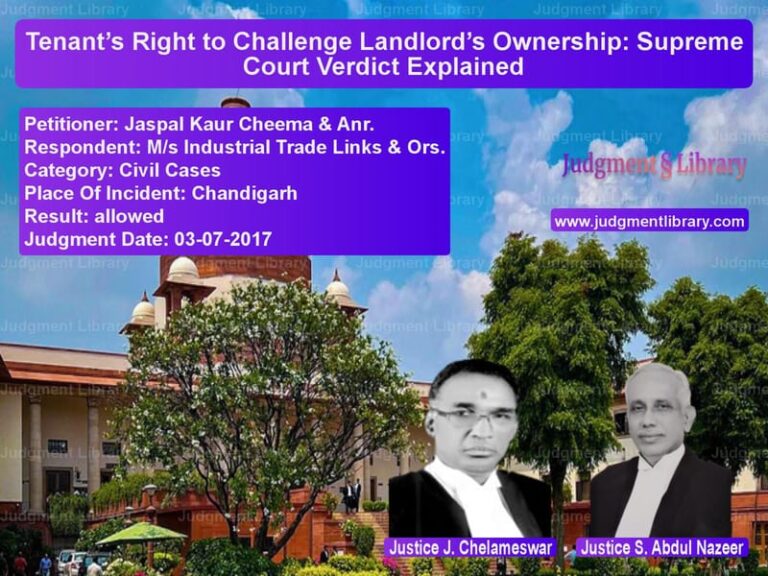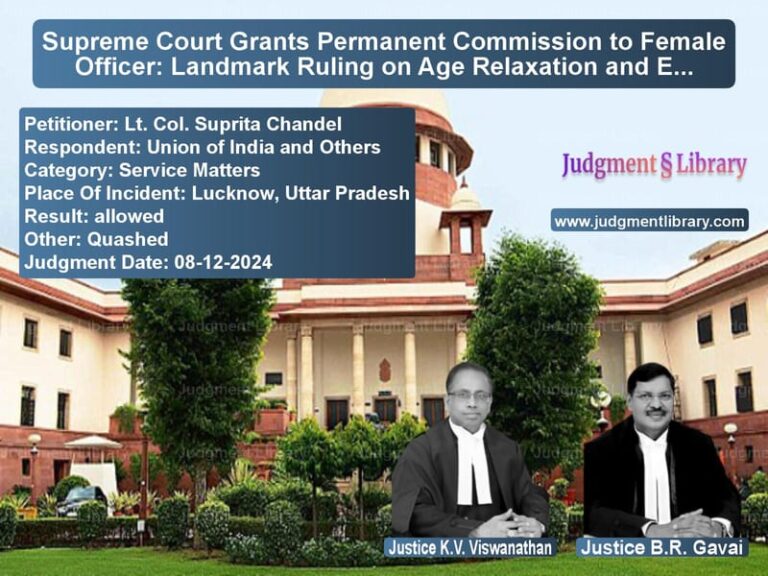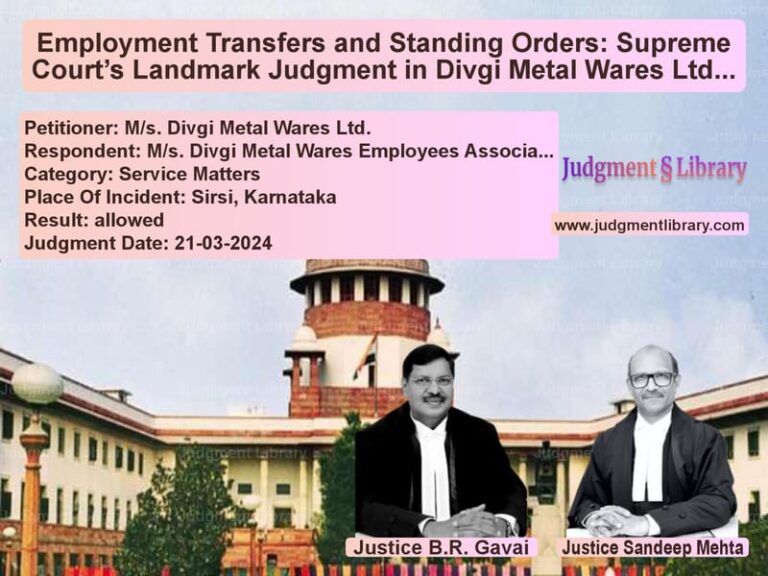Ineligibility in Insolvency Proceedings: Supreme Court Rules on Section 29A of IBC
The Supreme Court of India delivered a landmark judgment in Arun Kumar Jagatramka vs. Jindal Steel and Power Ltd. & Anr. on March 15, 2021, which clarified the applicability of ineligibility provisions under the Insolvency and Bankruptcy Code, 2016 (IBC) to liquidation proceedings. The Court addressed the question of whether a person ineligible under Section 29A of the IBC could propose a scheme of compromise or arrangement under Section 230 of the Companies Act, 2013 during the liquidation of a corporate debtor.
Background of the Case
The case arose when Jindal Steel and Power Limited (JSPL), an unsecured creditor of Gujarat NRE Coke Limited (GNCL), challenged an order of the National Company Law Tribunal (NCLT) that had allowed the convening of meetings for a scheme of compromise and arrangement under Section 230 of the Companies Act, 2013. The challenge was based on the argument that the promoter of GNCL, Mr. Arun Kumar Jagatramka, was ineligible under Section 29A of the IBC to propose a resolution plan and, therefore, could not be permitted to propose a scheme under Section 230.
The National Company Law Appellate Tribunal (NCLAT) upheld the challenge and ruled that a person ineligible under Section 29A of the IBC was also barred from proposing a scheme of compromise and arrangement under Section 230. This decision was appealed before the Supreme Court.
Arguments by the Petitioner
- The petitioner, Mr. Arun Kumar Jagatramka, argued that Section 230 of the Companies Act, 2013 does not impose any restriction on who can propose a scheme.
- It was contended that NCLAT had erroneously read the ineligibility under Section 29A of the IBC into Section 230 of the Companies Act, which was not the legislative intent.
- The petitioner claimed that Regulation 2B of the IBBI (Liquidation Process) Regulations, 2016, which prohibits persons ineligible under the IBC from participating in a scheme under Section 230, was ultra vires the Companies Act and violated fundamental rights under Articles 14 and 19 of the Constitution.
Arguments by the Respondents
- JSPL and other respondents argued that allowing a person disqualified under Section 29A of the IBC to regain control through a scheme under Section 230 would defeat the purpose of the IBC.
- It was emphasized that the IBC seeks to prevent persons responsible for the insolvency of a corporate debtor from regaining control through the resolution process.
- The respondents supported Regulation 2B, asserting that it was a valid regulatory measure to harmonize the IBC and the Companies Act.
Supreme Court’s Observations
The Supreme Court held that:
- Section 29A of the IBC was enacted to prevent individuals responsible for a company’s insolvency from participating in its resolution.
- The prohibition in Section 29A extends to the liquidation process under Section 35(1)(f) of the IBC.
- Since a scheme of compromise or arrangement under Section 230 is one of the modes of resolution during liquidation, the principles of the IBC must apply.
- Allowing a promoter disqualified under Section 29A to regain control through Section 230 would defeat the purpose of the IBC and create a loophole for circumventing the resolution process.
The Court stated:
“The purpose of ineligibility under Section 29A is to achieve a sustainable revival and to ensure that a person who is the cause of the problem cannot be a part of the solution. This rationale extends to schemes of compromise and arrangement under Section 230.”
Ruling on Regulation 2B
The Supreme Court upheld the validity of Regulation 2B, stating that:
- IBBI has the power to frame regulations to carry out the provisions of the IBC under Section 240.
- Regulation 2B is consistent with the IBC and serves to prevent misuse of the liquidation process.
- Even in the absence of Regulation 2B, the ineligibility under Section 29A would apply to Section 230.
Final Judgment
The Supreme Court dismissed the appeals and upheld the NCLAT ruling that a person ineligible under Section 29A of the IBC cannot propose a scheme of compromise or arrangement under Section 230 of the Companies Act. The Court reinforced the objective of the IBC and ensured that resolution and liquidation processes are not misused to benefit defaulting promoters.
Implications of the Judgment
This judgment has significant implications for insolvency law in India:
- It prevents promoters and ineligible persons from regaining control of a company through liquidation proceedings.
- It upholds the integrity of the insolvency resolution process by ensuring that ineligible persons do not use alternative legal provisions to circumvent the IBC.
- It confirms that the principles of ineligibility under the IBC apply across resolution and liquidation stages.
- It strengthens the role of the NCLT and NCLAT in maintaining discipline in insolvency proceedings.
The ruling is a major step in closing potential loopholes in the IBC framework and ensuring that the objectives of corporate insolvency resolution are effectively achieved.
Petitioner Name: Arun Kumar Jagatramka.Respondent Name: Jindal Steel and Power Ltd. & Anr..Judgment By: Justice Dhananjaya Y Chandrachud, Justice M R Shah.Place Of Incident: India.Judgment Date: 15-03-2021.
Don’t miss out on the full details! Download the complete judgment in PDF format below and gain valuable insights instantly!
Download Judgment: arun-kumar-jagatramk-vs-jindal-steel-and-pow-supreme-court-of-india-judgment-dated-15-03-2021.pdf
Directly Download Judgment: Directly download this Judgment
See all petitions in Bankruptcy and Insolvency
See all petitions in Corporate Governance
See all petitions in unfair trade practices
See all petitions in Judgment by Dhananjaya Y Chandrachud
See all petitions in Judgment by Mukeshkumar Rasikbhai Shah
See all petitions in dismissed
See all petitions in Stayed
See all petitions in supreme court of India judgments March 2021
See all petitions in 2021 judgments
See all posts in Corporate and Commercial Cases Category
See all allowed petitions in Corporate and Commercial Cases Category
See all Dismissed petitions in Corporate and Commercial Cases Category
See all partially allowed petitions in Corporate and Commercial Cases Category

